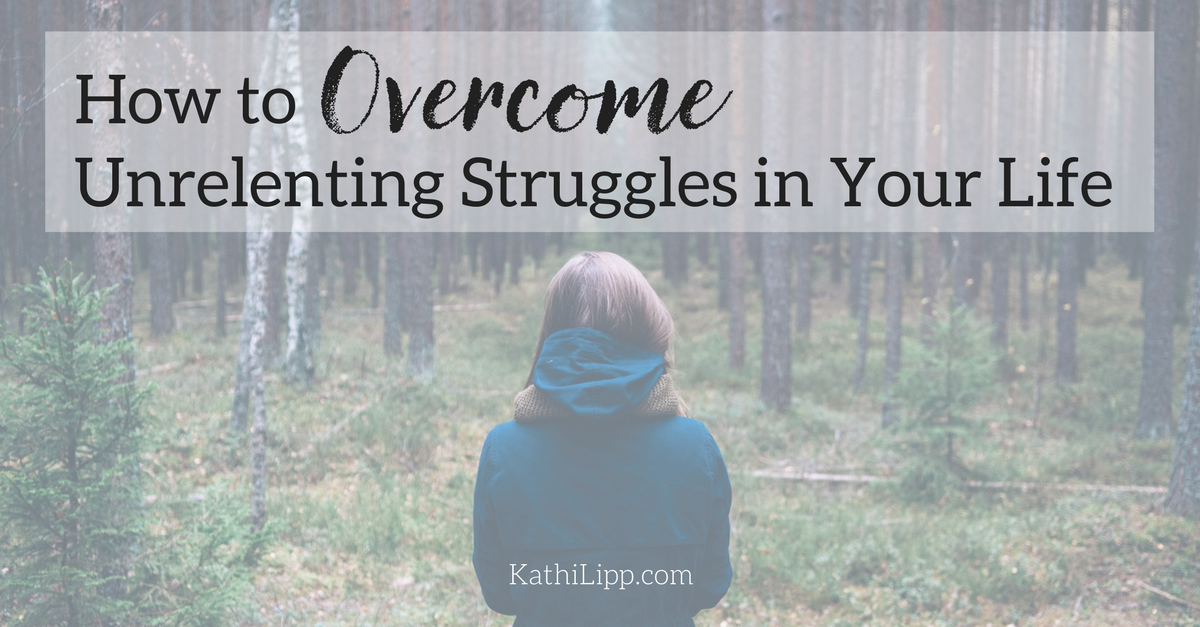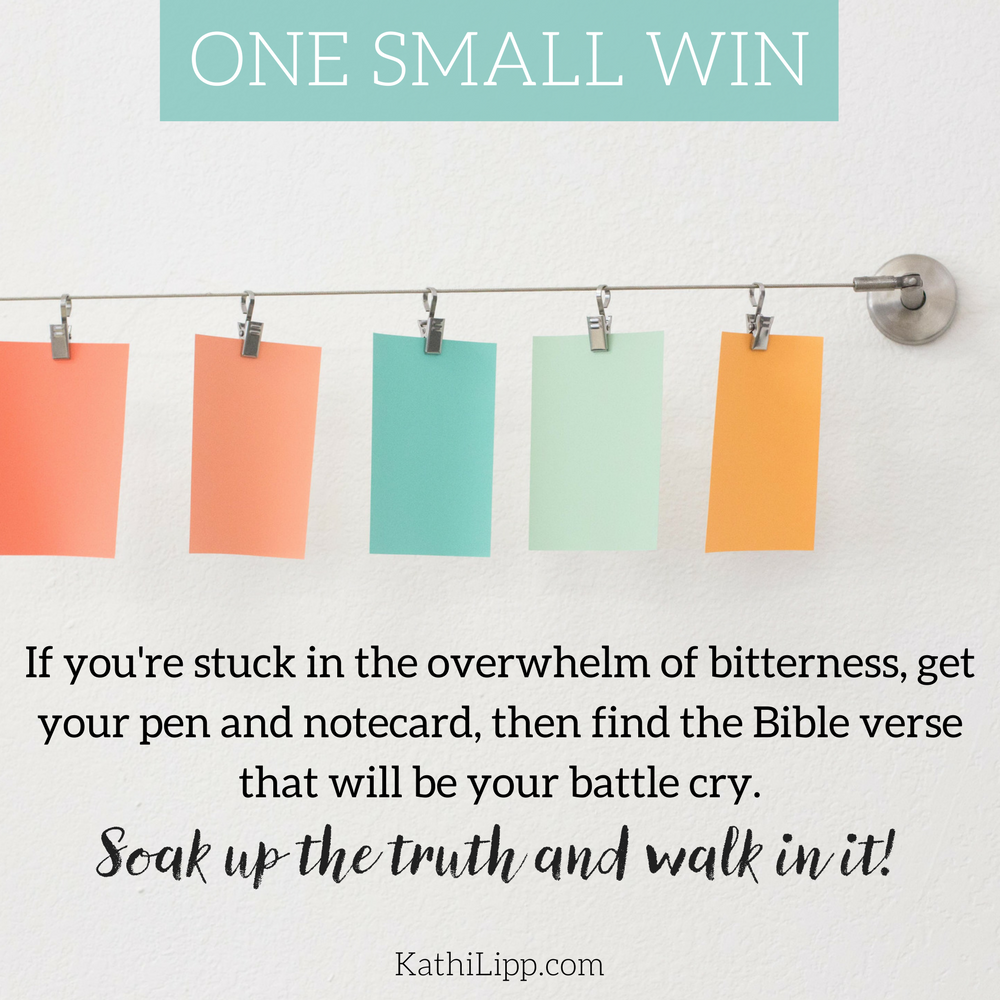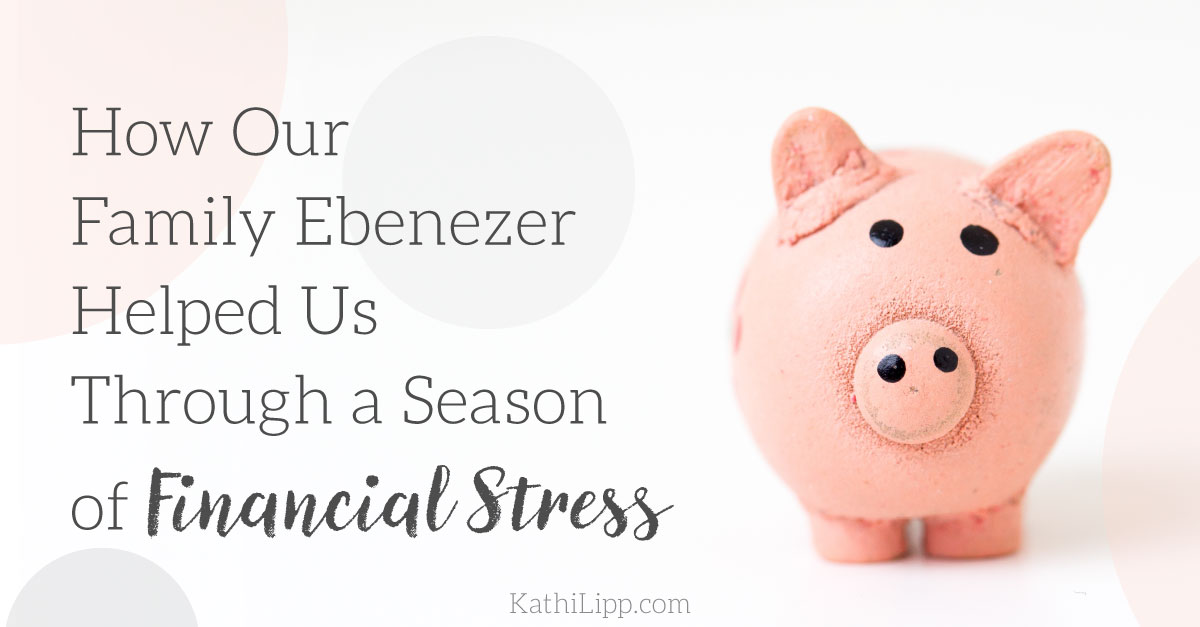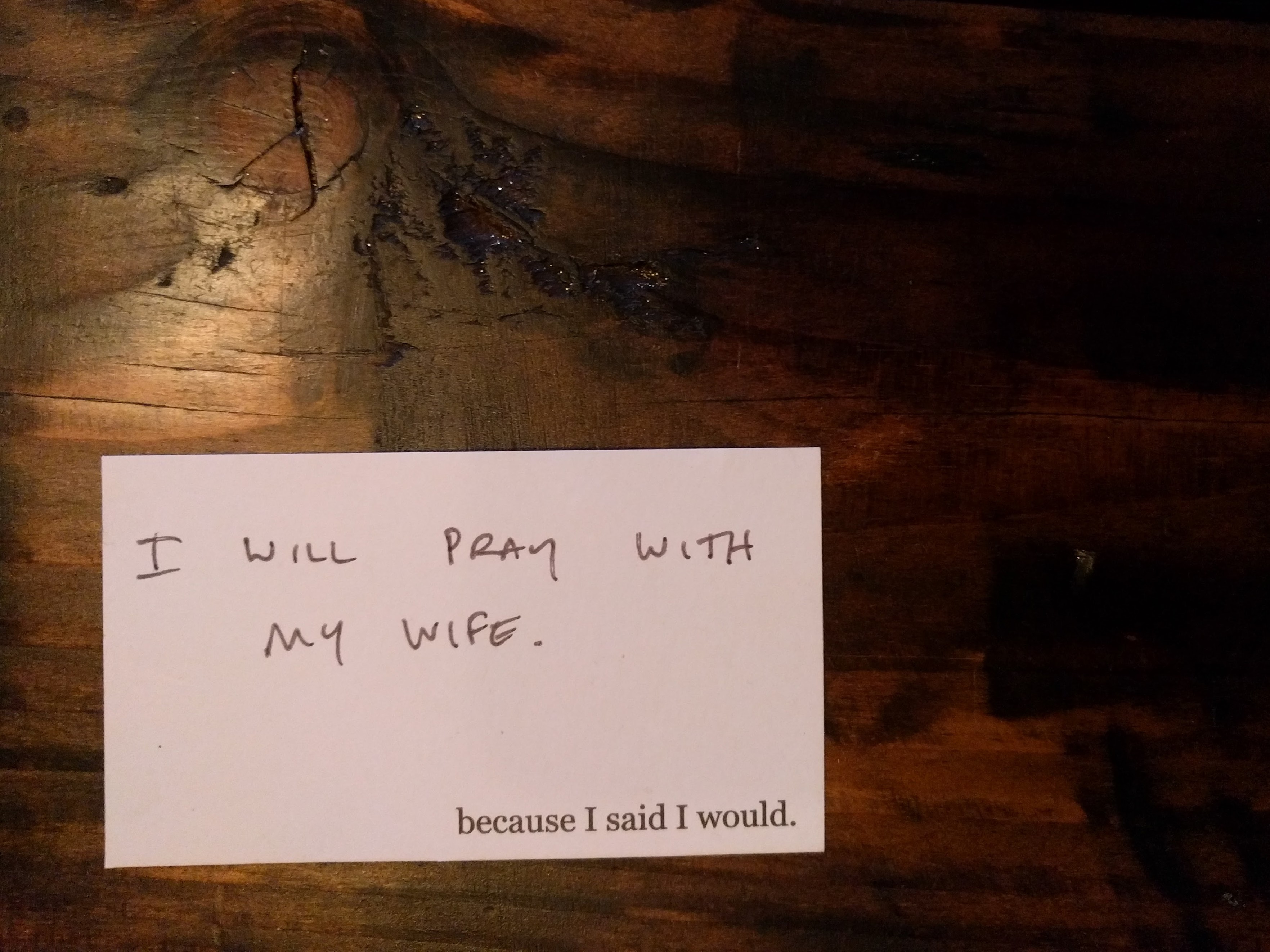
by Guest Blogger | Jan 15, 2017 | Blog, God, Guest Blog |

I struggle with bitterness.
It’s not something I love to admit, but it’s my reality.
Struggling with the same issue over and over is like being drawn into the warm glow of a campfire only to realize you’ve actually stepped into a raging inferno – again. It’s ugly. It’s exhausting. And it’s overwhelming.
Holding my bitterness captive
When God brought my struggle with bitterness to light in my early 20s, I took hold of a simple, yet powerful way to combat it: a notecard with a Bible verse written on it.
I know, I know, this seems too simple to have any type of impact. But let me share with you how it helped me hold my bitterness captive.
In my mid-20s, several of my friends married. They found their Prince Charming’s and set off into the sunset. I sludged away at work and the single life. It wasn’t where I wanted to be.
I had yet another friend get engaged and I was asked to be in the wedding along with another friend of mine who was also single. My friend and I fulfilled our bridesmaid responsibilities together for our mutual friend; however, over the course of our friend’s engagement, I noticed my friend making snide remarks and expressing her desire for the wedding to be over. She was cold, calloused and angry. In other words, she was bitter.
And it made me sad.
The ravaging of bitterness
I had an up-close-and-personal view of bitterness and how it ravaged her. And I knew I didn’t want that to be me.
It was after this I claimed scripture over this sin in my life.
Enter the notecard with a verse written on it.
When faced with circumstances that caused my bitterness to rear its ugly head, I took a notecard and wrote a scripture on the notecard that specifically pertained to my struggle. Then I carried it on me. Literally. I folded the card and kept it in my back pocket. And whenever those ugly feelings of bitterness seeped up, I whipped out my notecard and read the verse over and over.
Eroding bitterness
And you know what happened?
As those words permeated my heart and mind, bitterness began to erode. Suddenly, my bitter heart was now one defined by joy and peace because of the transforming power of scripture.
One Small Win: If you’re stuck in the overwhelm of bitterness – or any other sin that seems impossible to overcome – get your pen and notecard, then find the Bible verse that will be your battle cry. When those moments of temptation arise, divert your eyes and heart to the notecard with truth written on it. Soak up the truth and walk in it!
So, what’s your struggle? Grab a pen, notecard and your Bible and take your first step toward claiming victory!
Here are a few scripture recommendations if you need to let go, move forward or live boldly!

 Kate Hollimon delights in helping women learn their God-given purpose while growing in Christ through the study of scripture. Kate is a speaker and blogger who designed the Live Your Purpose Workshop to help women discover their purpose to glorify God. Kate is married to her husband Matthew of seven years and together they have two kiddos – a boy and a girl – and are in the thick of sippy cups, potty training, temper tantrums and peanut butter and jellies. Connect with Kate at www.katehollimon.com.
Kate Hollimon delights in helping women learn their God-given purpose while growing in Christ through the study of scripture. Kate is a speaker and blogger who designed the Live Your Purpose Workshop to help women discover their purpose to glorify God. Kate is married to her husband Matthew of seven years and together they have two kiddos – a boy and a girl – and are in the thick of sippy cups, potty training, temper tantrums and peanut butter and jellies. Connect with Kate at www.katehollimon.com.

by kathilipp | Jan 9, 2017 | Blog, Guest Blog, Relationships |

by Shaunti Feldhahn
You know that colleague or family member who drives you nuts? The one who second-guesses everything you do, is super-sensitive, and doesn’t return urgent emails for help?
No, wait, that would be my colleague! You probably have a different relationship that drives you nuts. Your grumpy step-father or passive-aggressive sister. A daughter with an Olympic level skill in eye-rolling. Or perhaps it is your spouse, as your marriage has slid from happy to hurting.
Or maybe it isn’t a bad relationship, but a good one … and you want it to be great.
Well, I’ve got great news. I’m a social researcher; and after years of study on what we call the 30-Day Kindness Challenge, we found three actions anyone can do to transform any relationship. Because targeted kindness is a superpower that will soften any heart.
Including our own!
Here’s what you do. Pick the person with whom you want a better relationship. For 30 days, you will:
- Say nothing negative about your person—either to them or about them to someone else. If you must provide negative feedback (for example, to discipline a child or correct a subordinate’s mistake), be constructive and encouraging without a negative tone.
- Every day, find one thing you can sincerely praise or affirm about your person and tell them, and tell someone else.
- Every day, do one small act of kindness or generosity for them.
That’s it! So simple. And yet in our research for The Kindness Challenge, 89% of relationships improved!
What does this look like in practice? Well, suppose you and your husband have been irritated with one another for months. Now every parenting decision is a battle, and your feelings are regularly hurt.
During the 30-Day Kindness Challenge, you resist the urge to ask “Why did you let the kids stay up so late!?” And you completely stop yourself from venting about it with your girlfriends at work. (This is just for thirty days, remember!) Instead, you’re looking for things to praise. So you notice it was really nice of him to come home early to get the boys to football practice. You thank him for it – and then you tell your girlfriends at work about that nice thing he did.
You’re also looking for that little act of generosity to do each day. So when he’s super tired after work, instead of getting annoyed that he’s not helping with dinner preparation you sincerely say, “I’ve got this. You go watch the game for a few minutes.”
Trust me: Starting this process will show us a whole lot about what needs to change. Not just in the other person: but in us. You will see just how negative you have been, in ways you never realized before. (In The Kindness Challenge, I outline the seven distinct types of negativity we found in the research, ranging from exasperation to overt criticism to suspicion. I strongly recommend you find out your negativity patterns, so you can watch for them!)
One Small Win: But as you go, you will also see something amazing: you will see your feelings changing. You’ll start appreciating the other person more. You’ll see their defenses lowering. And you may see enjoyment and positivity in the relationship you haven’t seen in years. An effort toward kindness won’t solve every problem – especially the big ones like addiction – but it will make them easier to solve.
I hope you will sign up for the 30-Day Kindness Challenge! Get a group of friends to do it together. Be a part of a movement of kindness in our culture – and in yourself!
Shaunti Feldhahn is a social researcher, speaker and best-selling author of books such as For Women Only. She thinks Kathi Lipp – and anyone who loves Kathi – rocks the world. She hopes all of you will go rock the world with kindness.
is a social researcher, speaker and best-selling author of books such as For Women Only. She thinks Kathi Lipp – and anyone who loves Kathi – rocks the world. She hopes all of you will go rock the world with kindness.

by Guest Blogger | Jan 8, 2017 | God, Guest Blog, Overwhelmed |

I was sick when I was pregnant and not just a little bit. Doctors diagnosed me with hyperemesis, which I loosely translate into “throwing your guts up day and night.”
When I got pregnant the second time, people assured me every pregnancy is different. And they were right. The second time was worse.
I sank into despair
For a woman who had led a largely sheltered and happy life, the sickness and helplessness overwhelmed me. Even though I knew the suffering would end with a blessing, my baby boys, I drifted from discouragement to despair. And then I sank. I also followed a harmful pattern that made everything worse. For the first time since I had fallen madly in love with Jesus, I didn’t pray. I didn’t read my Bible. Instead, I withdrew from God.
Just a month after my second son was born, I developed a close friendship with a woman named Linda whose sons were the same age as mine. We were both sick during our second pregnancy, but her nausea had a different source. It was caused by the chemo she was receiving for a rare and aggressive form of breast cancer.
Faced with a terminal illness, a new baby, and a grieving family, my friend didn’t react to overwhelmed by pushing God away. She drew close to Him.
In her truly overwhelming circumstances, she administered David’s remedy given in Psalm 62:8, “Trust in him at all times, you people; pour out your hearts to him, for God is our refuge.” (NIV, emphasis added)
What my friend taught me about seeking God
Instead of withdrawing from God like I did, Linda’s secret was that she withdrew each day with God. Linda brought all her emotions to God and let Him help her. She didn’t try to fake cheerfulness in His presence or avoid Him completely. Instead, she trusted Him with her feelings and found Him to be her refuge.
If you’ve made my mistake and developed a pattern of withdrawing from God instead drawing close, I have an action step for us to take. Let’s set a reminder on our phone or a write a note on our calendar each day at a specific time that says, “Pour out your heart to Him.” When our daily time arrives, let’s take the next five minutes to bring our honest feelings to God and ask Him to help us with them.
Creating a new pattern of withdrawing to Jesus in overwhelmed times instead of hiding from Him means we access His power, strength and peace to face the day. We’ll not only build deeper trust in God, but just like my friend Linda, we’ll strengthen and inspire others.
One Small Win: In the past, have I responded to overwhelmed by withdrawing from God or with Him? What steps can I take to either change or strengthen that pattern?

 Amy Carroll is a speaker and writer for Proverbs 31 Ministries. She’s the author of Breaking Up with Perfect as well as the director and coach of Next Step Speaker Services. Amy and her husband live in lovely Holly Springs, NC with a bossy miniature dachshund. You can find her on any given day texting her two sons at college, typing at her computer, reading a book, or trying to figure out one more alternative to cooking dinner. Share life with Amy at www.amycarroll.org and on Facebook.
Amy Carroll is a speaker and writer for Proverbs 31 Ministries. She’s the author of Breaking Up with Perfect as well as the director and coach of Next Step Speaker Services. Amy and her husband live in lovely Holly Springs, NC with a bossy miniature dachshund. You can find her on any given day texting her two sons at college, typing at her computer, reading a book, or trying to figure out one more alternative to cooking dinner. Share life with Amy at www.amycarroll.org and on Facebook.

by Guest Blogger | Jan 6, 2017 | Blog, Finances, Guest Blog, Overwhelmed |

by Amberly Neese
Money stinks.
Don’t get me wrong I appreciate the freedoms and opportunities money can afford, but the lack of it is draining.
My husband and I have been in full-time ministry for most of our lives. Budgeting has been a necessary reality since the beginning of our union. Dental bills, unexpected car repairs, medical issues, and the cost of everyday life created stress for us in various seasons but nothing could have prepared us for nine months of unemployment.
The cost of unemployment
We had just moved so I could accept my dream job at a Christian camp in the mountains of Arizona. I left teaching, took a pay cut, and trusted God’s call. Everything was awesome until my husband started looking for a job. He has a Master’s Degree from USC (on a full ride), decades of experience, and, frankly, he is a good guy. Nothing. No one seemed to have a need for that which he had to offer. It was arduous.
The tension in our home with our teenagers and between my husband and I became palpable. An increase in raised voices and shed tears precipitated a change. That change came in the form of a trip to the dollar store (God bless the dollar store).
We bought polished rocks, a candle, and a Sharpie. I pulled out an old glass hurricane lamp and charger plate from the garage and got to work. I put the candle in the middle of the charger plate, placed the hurricane over the candle and spread the rocks all around the outside of the glass. Then I called a family meeting where I told everyone anytime we felt overwhelmed or frustrated, we needed to contribute to our family’s ebenezer.
A family ebenezer
Ebenezer is more than the name of the lead character in that old Christmas story. It comes from the name of a stone raised by Samuel to commemorate a victory over the Philistines at Mizpeh (I Sam.12). The word itself comes from the Hebrew (ebhen “stone” + ezer “help”). God often asked His people to remember His goodness by building an ebenezer to remember His faithfulness. God didn’t do it to feed His ego, but instead, He knew we’d need the reminders.
We have very short memories in times of trouble!
Each person in my family was given a few rocks and asked to write something God had done to show His love in the past week. We used the permanent marker to scribble our ideas on the rocks. Anytime we saw the hand of God provide for our family, we wrote on a rock and placed it on the inside of the hurricane glass.
They served as our reminders
By the end of the unemployment drought, we had gone back to the dollar store three times to buy more rocks. Even on days when our financial situation looked bleak, it was very difficult to feel sorry for ourselves. Written on every rock we saw His faithfulness evidenced on a daily basis through others, circumstances, and His church. The arguments dissipated and the joy quotient vastly increased.
Someday when my kids leave the house to start families of their own, the first thing I will send with them is the makings of an ebenezer. I pray when they face the tumult of difficulty, such a visual reminder will commemorate God’s faithfulness, and the “joy of the Lord (will be their) strength.” (Nehemiah 8:10)
One Small Win: As we built an ebenezer, He built in us a solid trust in His provision. When we removed some of the rocks, we were reminded of all that had happened. We were flabbergasted at the creative ways God provided for our family.

Amberly Neese is a national speaker, author, and humorist with a passion for pointing others to the joy found in Christ. She has won hearts (and funny bones) of people all over the country at hundreds of conventions, camps, seminars, retreats, and chapels. She also serves as the program director at UCYC and an adjunct professor at Grand Canyon University. Amberly received her Master’s degree from Biola University.
is a national speaker, author, and humorist with a passion for pointing others to the joy found in Christ. She has won hearts (and funny bones) of people all over the country at hundreds of conventions, camps, seminars, retreats, and chapels. She also serves as the program director at UCYC and an adjunct professor at Grand Canyon University. Amberly received her Master’s degree from Biola University.
Amberly has been married to Scott Neese since 1992. They have two kids, Judah and Josiah. They live in beautiful Prescott, AZ and love the Food Network and all things Star Wars. You can follow her on Twitter and Instagram.

by kathilipp | Nov 3, 2016 | Blog, God, Guest Blog, Marriage |

Shortly after getting married, in fact it was on our honeymoon, when I slipped into my flirty pajamas, jumped into bed next to my husband and exclaimed, “OK, I’m ready!” and he asked, “For what?”
I replied with the obvious response, “To pray together … you know, a couple that prays together, stays together? That is what my mom always says.” To which he replied, “I will NEVER pray with you, that just isn’t something I do. It’s personal and between me and God.”
To be fair, maybe my timing was a little off. But I absolutely deflated. My spirit was crushed. Not only did I feel deprived of the coveted marriage ideal that couples are supposed to pray together, it was worse than that. I felt totally duped by my new husband. After all, we prayed together during our courtship.
I was devastated. Something so clearly beneficial to our marriage was rejected. My parents prayed together! And I was certain I fell in love with someone who was going to pray with me. It didn’t seem right! I knew God and I knew He loved me. I knew this was the man He meant for me to marry. He moved mountains to bring us together.
I come from a long line of prayer warriors. I like to think my sweet grandma lived to 103 because she had prayers God still wanted her to be praying. Growing up, when situations arose, my parents always told me to “just pray about it.”
The fact my husband and I didn’t pray together other than to bless our meals unsettled me and rocked my faith. I didn’t want anyone to know because I was certain every other Christian couple prayed together. It was like a cardinal rule for a good Christian marriage.
I loved my husband and I wanted to stay together. But I didn’t like the situation. Honestly, the only thing I could do was “just pray about it.” Instead of “Run Forrest, Run!” It became, “Pray Julie, Pray!” Originally, my prayers were that my husband would pray with me because I knew better and you NEVER say never, especially to God.
I truly believed Matthew 21:22.
You can pray for anything, and if you have faith, you will receive it.”
What I received by praying was far different than what I thought I wanted.
Through the process of praying without ceasing, God changed my heart and He changed my prayers. My heart turned from criticizing my husband, to seeking to understand my husband. My prideful prayers of me telling God how my husband needed to change eventually evolved into prayers of loving my husband for who he has been created to be.
Through the years, my prayers became more powerful. My husband witnessed first-hand how God faithfully answers even my smallest requests.
A few seasons back, I went through some personal challenges. I was really struggling, and I needed help. I asked my husband to pray for me and he did, without hesitation. He also prayed for me without my asking, just because he sensed I needed him to pray.
I cherish those moments when he pulled me close and prayed over me the most beautiful, loving prayers. Those times assured me how much God loves me and how my faithfulness and prayers honored Him and the man He gave me.
In the past, my husband and I have had this running joke that the first thing out of my husband’s mouth is “no.” This may have been what plagued him on our honeymoon, but I always say, “never say never” because he is definitely not the same man I am married to now.
He has since challenged himself to say “yes” more often. In fact, he took his “yes” a step further and ordered “promise cards” printed with the words: “because I said I would.” He hands these out at random times to people. This year for my birthday my husband gave me a promise card. It was the best gift a wife like me could ever receive. The words on the card said “I will pray with my wife. Because I said I would.”

Over twelve years ago my prayers stemmed from my own selfish motivation to change my husband, but God used them to change me. My consistent and persistent prayers changed the trajectory of our marriage for the better. I never know how or when God will answer my prayers.
But as my faith has grown, so has my trust in God and “knowing” no longer matters. I only do what I am called, which is to obediently seek Him. Today I teach other women how to pray for their husbands as this has simply become an act of obedience in response to an ever-loving God.
 Julie Landreth has a passion for healthy and thriving relationships–especially in marriage and friendship. She is a speaker and a “wife coach” who loves sharing with women her passion for prayer and ways to actively cultivate a thriving marriage. She leads a growing number of women in San Jose, CA through her curriculum: Consistency and Persistency: The Art of Praying for your Husband. Having been married 12 years, she and her husband have cultivated a marriage filled with intentional love, effective communication, sustainable fun, and a date night every Friday night for the last 9 years. She also finds deliberate ways to spend quality time with her 9-year-old son who shares many of her artistic talents. In addition, she is a freelance photographer and designer.
Julie Landreth has a passion for healthy and thriving relationships–especially in marriage and friendship. She is a speaker and a “wife coach” who loves sharing with women her passion for prayer and ways to actively cultivate a thriving marriage. She leads a growing number of women in San Jose, CA through her curriculum: Consistency and Persistency: The Art of Praying for your Husband. Having been married 12 years, she and her husband have cultivated a marriage filled with intentional love, effective communication, sustainable fun, and a date night every Friday night for the last 9 years. She also finds deliberate ways to spend quality time with her 9-year-old son who shares many of her artistic talents. In addition, she is a freelance photographer and designer.
If you would like to hear more from Julie and receive 5 Days of Prayers to get you started praying for your husband, please visit her and sign up at
http://eepurl.com/cmn9CX.
Now available!

In this six-week Bible Study you will, possibly for the first time, truly understand how God wants you to be free. Free from clutter so you can be free to change your world. We have an online version as well as a traditional workbook with DVD option.
Find out more: http://www.kathilipp.com/clutter-free-bible-study/

by kathilipp | Oct 20, 2016 | Clutter Free, God, Guest Blog |

When my students and I read Mary Shelley’s Frankenstein, one line—spoken by the murderous creature to Victor Frankenstein—always gives me a cold chill:
“Slave … You are my creator, but I am your master; obey!”
Each year, I tell my class, “This is such an apt personification of addiction. What starts as a small habit, seemingly under our control, quickly morphs into a monster that takes complete control of our lives.”
I speak from very painful, very personal experience.
Decades ago, when my clutter collecting craze was in full swing, I exhibited many classic signs of addiction.
- Inability to Stop. I made up elaborate budgeting spreadsheets. I put cash in envelopes. But every single time I promised myself, “I’m done buying so much stuff!” I’d see something else and make an exception, “Just this once.”
- Withdrawal Symptoms. I cut up and canceled credit cards. Then, as my anxiety level would rise and I couldn’t calm myself by running out for a quick shopping spree, I’d open new accounts.
- Social Sacrifices. The more stuff took over our home, the less space there was for people. We quit inviting friends and family over because there was no room for them to stay. Or, eventually, even sit.
- Solitude. I never shopped with friends. Going on a buying binge had one purpose: to give me my fix, for which I wanted no witnesses.
- Secrecy. I hid my purchases from my husband, and he had no idea how many credit cards “we” had. He was clueless to the extent of my possession obsession.
- Supply Maintenance. I stockpiled food, toiletries, gifts for upcoming holidays. I started numerous businesses and ordered tons of inventory. Buying these things gave me a thrill. So did storing and counting it all.
- Increasingly High Doses. Just as a drug addict needs larger and larger amounts to experience the “high,” I needed to spend more and more, purchasing bigger and better things, to feel the buying buzz.
- Risky Behavior. I “stole from Peter to pay Paul” regularly, paying bills just in the nick of time to avoid being charged late fees, having utilities shut off, defaulting on loans.
- Financial Difficulties. Our checking account balance was typically so low, I had to call the bank each day to find out how much (if anything) was available for groceries. We ultimately ended up in bankruptcy court.
- Relational Difficulties. When my husband discovered how bad things had gotten, he felt completely betrayed. The bankruptcy process was deeply humiliating for him.
If some of these sound scarily familiar, here are four things I want anyone wrestling with possession obsession to know:
1 — It’s not your fault.
Slinging blame and wallowing in guilt serve no constructive purpose. Facing the facts and taking personal responsibility do. And the most responsible thing you can do is ask for help. Starting now.
2 — You’re not alone.
Shame depends on secrecy; addiction thrives in isolation. When you reach out to those who can help and support you, shame’s power breaks and addiction’s grip loosens. You need accountability, both for individual recovery and for financial recovery.
3 — It’s not too late.
The enemy of your soul says, “You’re beyond all hope!” It’s a lie.
In Romans 7:19-25, the apostle Paul chronicles this vivid description of addiction: “For I do not do the good I want to do, but the evil I do not want to do—this I keep on doing. Now if I do what I do not want to do, it is no longer I who do it, but it is sin living in me that does it.”
So I find this law at work: Although I want to do good, evil is right there with me. For in my inner being I delight in God’s law; but I see another law at work in me, waging war against the law of my mind and making me a prisoner of the law of sin at work within me. What a wretched man I am! Who will rescue me from this body that is subject to death?
And reminds you of the hope that is always available to you:
Thanks be to God, who delivers me through Jesus Christ our Lord!
4 — Yes, you can.
You can address the core issues that trigger your spending sprees and clutter collections. For me, it came down to a combination of “buying to become” and “never enough” syndrome. Over time, I retrained my brain to disconnect my identity from my possessions, and to revel in gratitude for what I already have.
You can find healthy ways to settle the everyday ordinary problems that a possession obsession promises—but utterly fails—to solve. I’d turned pretty much any “negative” emotion into an excuse to spend: sadness, anger, loneliness, and boredom all lifted (albeit temporarily) with a bit of “retail therapy.”
It took time to develop new self-soothing strategies. Over several months, I built a list of my Favorite Free Ways to Feel Better Fast (which you can download at the end of this article!)
You can develop safe systems for making necessary purchases. I always take a list when heading to Safeway or Target. My husband and I pre-plan major purchases. Whenever something catches my eye, I have a pre-decided wait time (yes, even if it’s on sale.)
I write it on my wish list and set a calendar reminder for a week away. Nine times out of ten, when the alert pops up, I think to myself, “I was going to spend how much for that?!?”
If you feel trapped in possession obsession right now, please know that I understand.
And please hear the truth: Your stuff doesn’t have to morph into a monster that enslaves you.
You can do the brave work to break free. You can learn to master your spending and storing habits so that your stuff serves you, not the other way around.
Sign up to receive updates from Cheri, and receive her FREE “15 Favorite Free Ways to Feel Better Fast” PDF.
 Cheri Gregory is the co-author, with Kathi Lipp, of The Cure for the Perfect Life and the upcoming Overwhelmed. Her goal is to equip women to relate and create with less drama, more delight. Connect with Cheri on Facebook and at www.CheriGregory.com.
Cheri Gregory is the co-author, with Kathi Lipp, of The Cure for the Perfect Life and the upcoming Overwhelmed. Her goal is to equip women to relate and create with less drama, more delight. Connect with Cheri on Facebook and at www.CheriGregory.com.

 Kate Hollimon delights in helping women learn their God-given purpose while growing in Christ through the study of scripture. Kate is a speaker and blogger who designed the Live Your Purpose Workshop to help women discover their purpose to glorify God. Kate is married to her husband Matthew of seven years and together they have two kiddos – a boy and a girl – and are in the thick of sippy cups, potty training, temper tantrums and peanut butter and jellies. Connect with Kate at www.katehollimon.com.
Kate Hollimon delights in helping women learn their God-given purpose while growing in Christ through the study of scripture. Kate is a speaker and blogger who designed the Live Your Purpose Workshop to help women discover their purpose to glorify God. Kate is married to her husband Matthew of seven years and together they have two kiddos – a boy and a girl – and are in the thick of sippy cups, potty training, temper tantrums and peanut butter and jellies. Connect with Kate at www.katehollimon.com.




 Amy Carroll is a speaker and writer for
Amy Carroll is a speaker and writer for 




 Julie Landreth has a passion for healthy and thriving relationships–especially in marriage and friendship. She is a speaker and a “wife coach” who loves sharing with women her passion for prayer and ways to actively cultivate a thriving marriage. She leads a growing number of women in San Jose, CA through her curriculum: Consistency and Persistency: The Art of Praying for your Husband. Having been married 12 years, she and her husband have cultivated a marriage filled with intentional love, effective communication, sustainable fun, and a date night every Friday night for the last 9 years. She also finds deliberate ways to spend quality time with her 9-year-old son who shares many of her artistic talents. In addition, she is a freelance photographer and designer.
Julie Landreth has a passion for healthy and thriving relationships–especially in marriage and friendship. She is a speaker and a “wife coach” who loves sharing with women her passion for prayer and ways to actively cultivate a thriving marriage. She leads a growing number of women in San Jose, CA through her curriculum: Consistency and Persistency: The Art of Praying for your Husband. Having been married 12 years, she and her husband have cultivated a marriage filled with intentional love, effective communication, sustainable fun, and a date night every Friday night for the last 9 years. She also finds deliberate ways to spend quality time with her 9-year-old son who shares many of her artistic talents. In addition, she is a freelance photographer and designer. 

 Cheri Gregory is the co-author, with Kathi Lipp, of
Cheri Gregory is the co-author, with Kathi Lipp, of 



